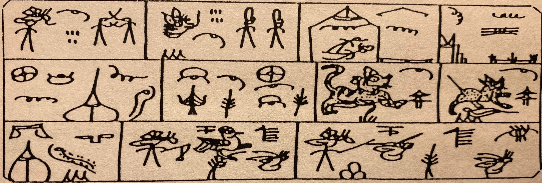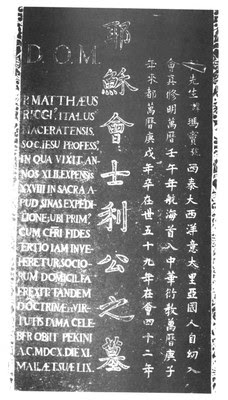In the fifth comment to "Artistic Sinograph: Buddha" (11/11/21), stephen reeves says he'd like to hear about the origins of Zen. This has always been one of my favorite topics, so I'm more than happy to tell it.
"Zen" entered the English lexicon already by 1727. Here's a succinct, serviceable, popular explanation of its derivation:
[Japanese zen, from Early Middle Chinese dʑian, meditation; also the source of Mandarin chán), from Pali jhānaṃ, from Sanskrit dhyānam, from dhyāti, he meditates.]
Word History: Zen, a word that evokes the most characteristic and appealing aspects of Japanese culture for many English speakers, is ultimately of Indo-European origin. The Japanese word zen is a borrowing of a medieval Chinese word (now pronounced chán, in modern Mandarin Chinese) meaning "meditation, contemplation." Chán is one of the many Buddhist terms in Chinese that originate in India, the homeland of Buddhism. A monk named Bodhidharma, said to be of Indian origin, introduced Buddhist traditions emphasizing the practice of meditation to China in the 5th century and established Chan Buddhism. From the 7th century onward, elements of Chan Buddhism began to reach Japan, where chán came to be pronounced zen. The Chinese word chán is a shortening* of chán'nǎ "meditation, contemplation" a borrowing [VHM: transcription] of the Sanskrit term dhyānam. The Sanskrit word is derived from the Sanskrit root dhyā-, dhī-, "to see, observe," and the Indo-European root behind the Sanskrit is *dheiə-, *dhyā-, "to see, look at." This root also shows up in Greek, where *dhyā- developed into sā-, as in the Common Greek noun *sāma, "sign, distinguishing mark." This noun became sēma in Attic Greek and is the source of English semantic.
Source: American Heritage® Dictionary of the English Language, Fifth Edition.
*The same thing happened with the Chinese transcription of "Buddha", as we saw in the previous post. The Chinese have a low tolerance for maintaining the full transcriptions of words from other languages, usually shortening them by one or more syllables.]
Read the rest of this entry »

